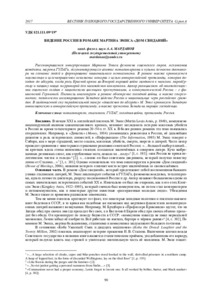Please use this identifier to cite or link to this item:
https://elib.psu.by/handle/123456789/20844Full metadata record
| DC Field | Value | Language |
|---|---|---|
| dc.contributor.author | Марданов, А. А. | - |
| dc.date.accessioned | 2017-12-07T11:58:47Z | - |
| dc.date.available | 2017-12-07T11:58:47Z | - |
| dc.date.issued | 2017 | - |
| dc.identifier.citation | Вестник Полоцкого государственного университета. Серия A, Гуманитарные науки. - 2017. - № 10. – C. 90-93. | ru_RU |
| dc.identifier.issn | 2070-1608 | - |
| dc.identifier.uri | https://elib.psu.by/handle/123456789/20844 | - |
| dc.description | The Vision of Russia in Martin Amis’s Novel the House of Meetings A. Mardanau | ru_RU |
| dc.description.abstract | Рассматривается интерпретация Мартина Эмиса феномена советского строя, механизмов вождизма, зверств ГУЛАГа, дегуманизирующего влияние тоталитаризма и культа личности диктатора на сознание людей и формирование национального менталитета. В романе также критикуется невежество и целенаправленное искажение истории с целью антироссийской пропаганды, которая доходит до абсурда, когда роль Красной армии во Второй мировой войне сводится к насилию, мародёрству и захвату новых территорий для насаждения коммунизма. Автор размышляет об отождествлении советских солдат с нацистскими военными преступниками, а коммунистической России – с фашистской Германией. Писатель анализирует в романе обострение холодной войны, а также стереотипное, политически ангажированное Западное вúдение России и национальных черт российских граждан. В свойственной ему парадоксальной манере «доведения до абсурда» М. Эмис критикует Западную антисоветскую и антироссийскую пропаганду, а также претензии Запада на мировое господство.= the article deals with M. Amis’s interpretation of the Soviet slavery phenomenon, the mechanisms of the cult of the leader, the atrocities of the Gulag, the dehumanizing influence of totalitarianism and the cult of the dictator’s personality on people’s minds and the formation of the national mentality. the ignorance and deliberate distortion of history with the purpose of anti-Russian propaganda are also criticized in the novel. They are reduced to absurdity when the role of the Red army in World War II is reduced to violence, looting, and seizing new territories with the view of spreading communism. the author deliberates on the identification of Soviet soldiers with Nazi war criminals, whereas Communist Russia is identified with Nazi Germany. the writer analyzes in the novel the aggravation of the cold war, as well as the stereotypical and politically biased Western vision of Russia and Russian citizens’ national traits. | ru_RU |
| dc.language.iso | ru | ru_RU |
| dc.publisher | Полоцкий государственный университет | ru_RU |
| dc.relation.ispartof | Веснік Полацкага дзяржаўнага ўніверсітэта. Серыя А, Гуманітарныя навук | be_BE |
| dc.relation.ispartof | Herald of Polotsk State University Series A, Humanity sciences | en_EN |
| dc.relation.ispartof | Вестник Полоцкого государственного университета. Серия A, Гуманитарные науки | ru_RU |
| dc.relation.ispartofseries | Серия A, Гуманитарные науки;2017. - № 10 | - |
| dc.rights | open access | ru_RU |
| dc.subject | Государственный рубрикатор НТИ - ВИНИТИ::ОБЩЕСТВЕННЫЕ НАУКИ::Литература. Литературоведение. Устное народное творчество | ru_RU |
| dc.subject | Тоталитаризм | ru_RU |
| dc.subject | Сталинизм | ru_RU |
| dc.subject | ГУЛАГ | ru_RU |
| dc.subject | Холодная война | ru_RU |
| dc.subject | Пропаганда | ru_RU |
| dc.subject | Россия | ru_RU |
| dc.subject | Totalitarianism | ru_RU |
| dc.subject | Stalinism | ru_RU |
| dc.subject | Gulag | ru_RU |
| dc.subject | Cold war | ru_RU |
| dc.subject | Propaganda | ru_RU |
| dc.subject | Russia | ru_RU |
| dc.title | Видение России в романе Мартина Эмиса «Дом свиданий» | ru_RU |
| dc.type | Article | ru_RU |
| dc.identifier.udc | 821.111.09“19” | - |
| Appears in Collections: | 2017, № 10 | |
Items in DSpace are protected by copyright, with all rights reserved, unless otherwise indicated.
